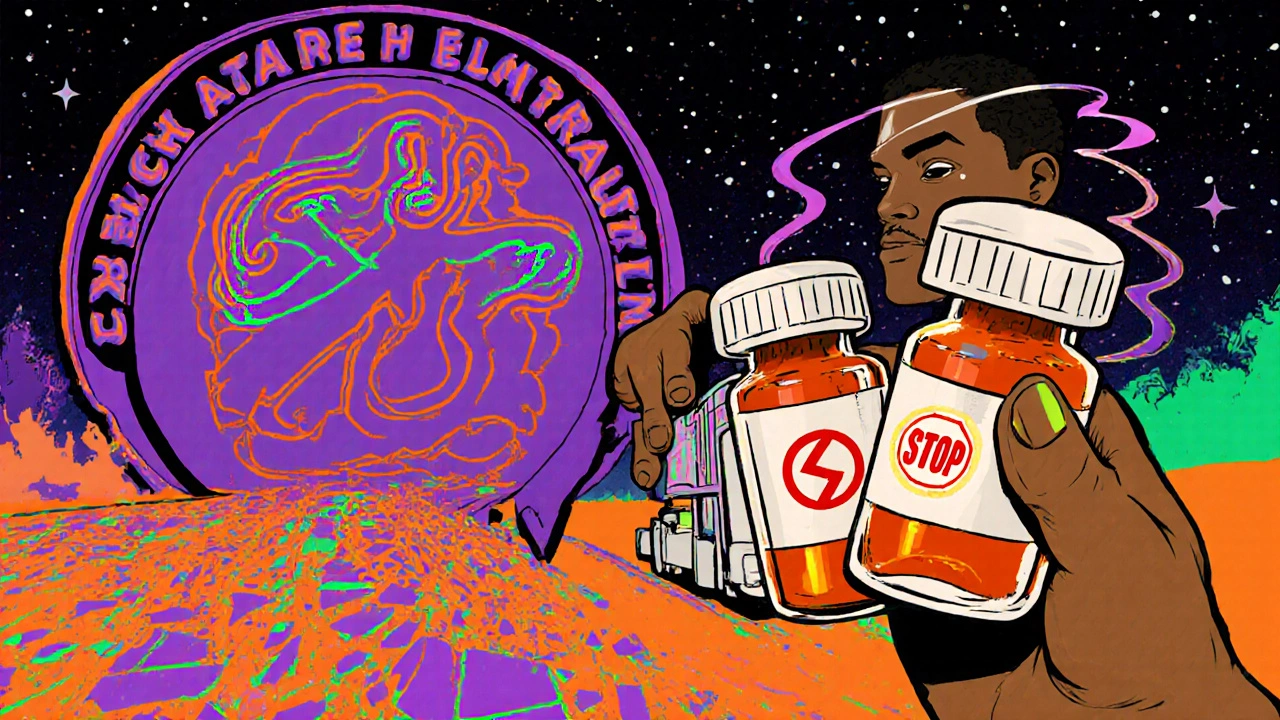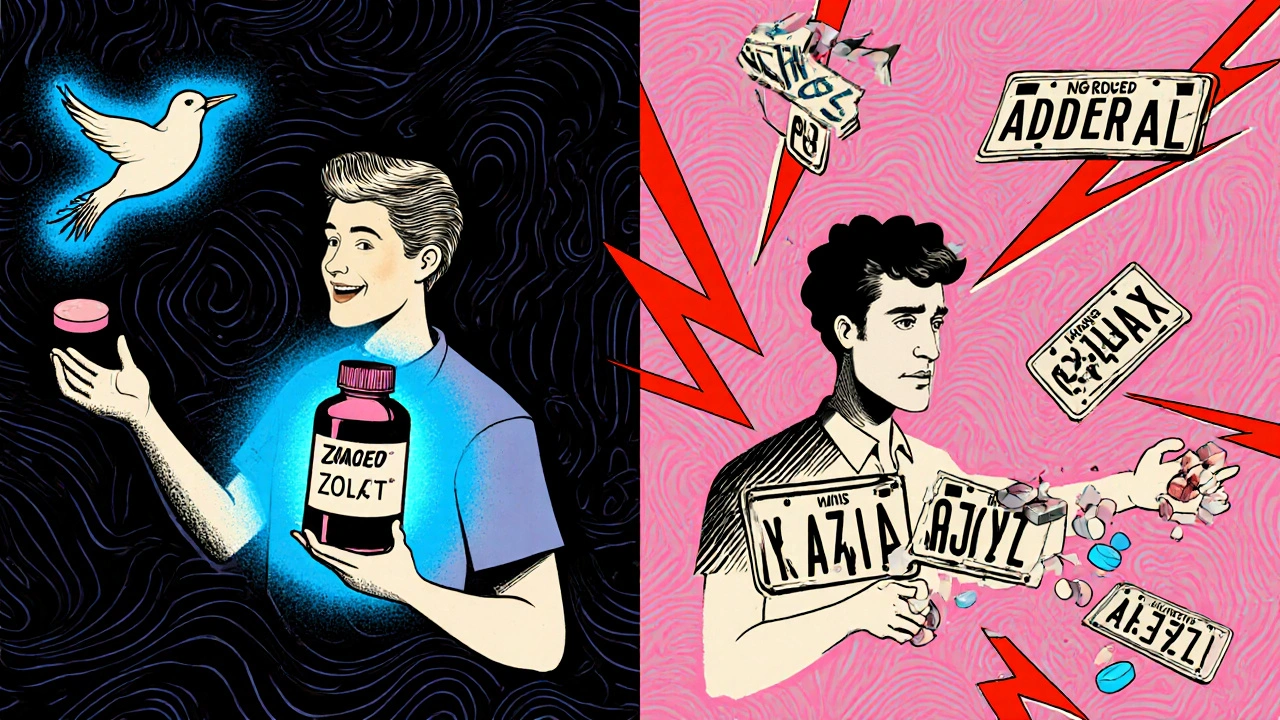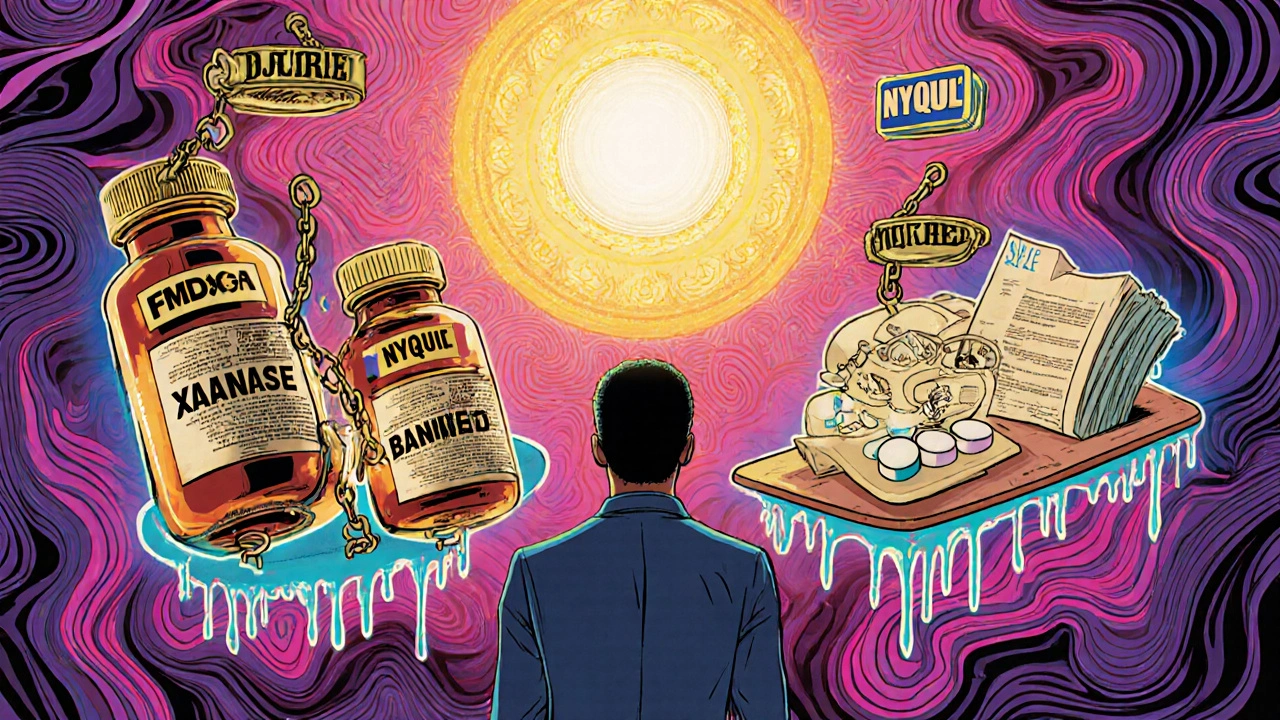Commercial Driving and Medications: Safety Compliance and Side Effects

Commercial Driver Medication Checker
Check if your medication is permitted for commercial driving. The DOT has strict rules about prescription and over-the-counter medications. Some medications that seem harmless can disqualify you from driving a commercial vehicle.
What Medications Can Keep You Off the Road?
If you drive a commercial vehicle, your prescription bottle could be just as dangerous as a bottle of beer. The DOT doesn’t care if your medication was prescribed by a doctor, if it’s legal in your state, or if it’s helped you sleep for years. If it makes you drowsy, sluggish, or alters your judgment, you’re not allowed to drive. This isn’t a suggestion-it’s federal law, and violations can cost you your license, your job, and even your freedom.
The Federal Motor Carrier Safety Administration (FMCSA) enforces strict rules under 49 CFR §391.41(b)(3) and §382.107. These rules say you must be free from any condition-physical, mental, or organic-that could impair your ability to safely operate a commercial motor vehicle. That includes medications. And yes, that means even if you’re taking them exactly as prescribed.
Forbidden Drugs: What’s on the Prohibited List?
Some drugs are outright banned, no exceptions. Schedule I substances like marijuana (even if prescribed for medical use), PCP, and heroin are automatic disqualifiers. But it’s not just illegal drugs. Many common prescription medications are also off-limits:
- Amphetamines (Adderall, Vyvanse) - even for ADHD
- Narcotics (oxycodone, hydrocodone, codeine)
- Barbiturates and benzodiazepines (Xanax, Valium, Klonopin)
- Antipsychotics and certain antidepressants (if they cause sedation or dizziness)
- Any over-the-counter medicine with dextromethorphan or pseudoephedrine - yes, even cold pills
According to Acuity International’s 2023 analysis, these substances are flagged because they directly interfere with reaction time, alertness, and decision-making. In 2020, 4.2% of large truck crashes involved drivers who tested positive for disqualifying substances - resulting in over 1,200 deaths. The FMCSA doesn’t take chances.
Why Are ADHD Medications Banned for CDL Drivers?
This is one of the most confusing and frustrating rules for drivers. Adderall and Vyvanse are widely prescribed for ADHD. They help people focus, stay organized, and function normally. But for commercial drivers, they’re banned - period.
The reason? Stimulants can cause jitteriness, anxiety, insomnia, and heart palpitations. They may help you stay awake, but they don’t make you a better driver. In fact, the FMCSA says they can increase risk-taking behavior and reduce your ability to respond calmly under pressure. Even if you’ve been on them for years without issues, the DOT doesn’t recognize personal experience as proof of safety.
Non-CDL drivers - those operating smaller trucks under 26,000 lbs - can use these medications legally. But once you hold a commercial license, the rules change. The FMCSA doesn’t make exceptions based on dosage, duration, or how well you tolerate the drug. If it’s on the list, you can’t use it.
What About Prescription Antidepressants?
Depression and anxiety are common among long-haul drivers. Isolation, irregular sleep, and high stress take a toll. Many drivers rely on SSRIs like sertraline (Zoloft) or escitalopram (Lexapro). These are generally allowed - but only if your doctor confirms they’re not causing side effects that interfere with driving.
Dr. Gary Solomon, a certified Medical Examiner with over 20 years of experience, says 35% of drivers he examines are on some kind of psychiatric medication. The key isn’t the drug itself - it’s how it affects you. If you’re drowsy in the morning, dizzy after meals, or feel emotionally numb behind the wheel, your doctor must document that you’re safe to drive.
Many drivers don’t realize they need to tell their Medical Examiner about these medications during their DOT physical. If you don’t disclose them, and they show up on a drug test, you’ll be flagged for falsification - which carries heavier penalties than the medication itself.

How the DOT Physical Works - And What You Must Disclose
Your DOT physical isn’t just a quick checkup. It’s a full medical review. You’ll fill out Form FMCSA-2015-0180-0017, which asks for a complete list of all medications - prescription, over-the-counter, and supplements. You must list:
- Drug name and dosage
- Prescribing doctor’s name and contact info
- Reason for use
- How long you’ve been taking it
Even things like Benadryl, NyQuil, or Sudafed count. These contain dextromethorphan or pseudoephedrine, which can trigger false positives on drug screens. Your Medical Examiner will review each medication against FMCSA guidelines and decide if it’s safe.
Failure to disclose anything - even something you think is harmless - can lead to immediate disqualification. And if you’re caught lying later, you could face fines, suspension, or criminal charges.
What If You Need a Disqualifying Medication?
Some drivers have chronic pain, epilepsy, or severe sleep apnea and need medications that the DOT bans. What then?
You have two options:
- Switch to an approved alternative
- Apply for a Skill Performance Evaluation (SPE) certificate
For example, if you’re on oxycodone for back pain, your doctor might switch you to non-opioid options like gabapentin or physical therapy. If you have ADHD, Strattera (atomoxetine) is a non-stimulant alternative that’s allowed. According to TruckersReport.com, 43 drivers successfully petitioned for exemptions after switching to Strattera.
If no safe alternative exists, you can apply for an SPE certificate. This requires you to demonstrate, through a series of tests and evaluations, that you can operate a commercial vehicle safely despite your condition. The FMCSA’s 2023 report shows a 68% approval rate for SPE applications - but the process takes months and costs thousands.
Real Stories: Drivers Who Lost Their Licenses
A 2022 survey by the Owner-Operator Independent Drivers Association (OOIDA) found that 63% of CDL drivers had to stop taking medications that worked for them - often for chronic pain, depression, or sleep disorders. Forty-one percent said their health got worse as a result.
One driver in Ohio lost his license after a routine test showed traces of Adderall. He’d been taking it for 12 years for ADHD. His doctor had prescribed it. His employer knew. But under DOT rules, it didn’t matter. He spent six months out of work, went into debt, and eventually had to sell his truck.
Another driver in Texas was pulled over for swerving. He had taken a single dose of Xanax for panic attacks before a long haul. He didn’t feel impaired. But the test came back positive. His company terminated him. His license was suspended. He’s still fighting to get it back.

How Carriers Are Fighting Back - And What You Should Do
Companies are starting to wake up. In 2019, only 18% of carriers used electronic medication tracking systems. By 2024, that number jumped to 67%. These systems alert supervisors when a driver is on a disqualifying drug, allowing them to reassign routes or offer support before an incident occurs.
FMCSA data shows that 28% of carriers failed medication management audits in 2023 - and paid an average fine of $14,200 per violation. That’s why smart companies now require:
- Pre-hire medication reviews
- Quarterly check-ins with drivers’ doctors
- Access to non-stimulant ADHD treatments
- On-site mental health resources
If you’re a driver, don’t wait for your company to act. Take control:
- Keep a Medication Action Plan with your doctor - document how each drug affects your driving.
- Use the FMCSA’s Driving Impairment Checklist to self-assess before every trip.
- Never drive if you feel foggy, tired, or anxious - even if you think it’s "just a little."
- Always disclose everything during your DOT physical.
The Future: Wearables and Real-Time Monitoring
The FMCSA is funding a $4.7 million pilot program with Samsara and KeepTruckin to test biometric wearables that monitor heart rate variability, eye movement, and reaction time in real time. If the tech works, it could one day replace blanket bans with personalized safety assessments.
But until then, the rules stay strict. The Commercial Vehicle Medical Research Foundation warns that 43% of drivers over 50 rely on medications that conflict with DOT standards. Without policy changes, they predict a shortage of 54,000 drivers by 2027.
Right now, the system is binary: you’re either cleared or disqualified. No gray area. No exceptions. That’s why understanding the rules - and planning ahead - isn’t just smart. It’s essential.
What’s Coming Next?
In February 2024, the FMCSA proposed expanding its list of reportable medications to include all benzodiazepines - even if prescribed. That’s a big deal. These drugs are commonly used for anxiety, insomnia, and muscle spasms. If the rule passes, thousands of drivers could lose their licenses overnight.
And starting April 1, 2024, any carrier that fails to report a medication restriction in the Drug and Alcohol Clearinghouse within 24 hours faces a $1,250 fine. That means your employer is now legally required to track your meds - whether you like it or not.
The bottom line? Medication compliance isn’t optional. It’s not a suggestion. It’s the law. And the consequences of ignoring it are real, costly, and life-altering.
Can I drive a commercial vehicle if I take antidepressants?
Yes - but only if your doctor confirms the medication doesn’t cause drowsiness, dizziness, or impaired judgment. SSRIs like Zoloft or Lexapro are generally allowed. However, tricyclic antidepressants or those with strong sedative effects may be disqualifying. Always disclose all medications during your DOT physical.
Is Adderall allowed for CDL drivers?
No. Adderall and other amphetamine-based stimulants are strictly prohibited for commercial drivers, even with a valid prescription. The FMCSA considers them incompatible with safe operation of a commercial motor vehicle. Non-stimulant alternatives like Strattera may be approved.
What happens if I get caught driving while on a banned medication?
You’ll be immediately removed from duty. Your CDL may be suspended or revoked. You’ll be listed in the Drug and Alcohol Clearinghouse, which employers check before hiring. You may face fines, lose your job, and need to complete a return-to-duty process - including evaluation by a Substance Abuse Professional - before driving again.
Can I use CBD oil as a commercial driver?
No. Even if it’s labeled "THC-free," CBD products can still contain trace amounts of THC, which triggers a positive drug test. The FMCSA considers any detectable level of THC a violation. There are no exceptions. Avoid all CBD products while holding a CDL.
Do I need to tell my employer about my medications?
You’re not required to tell your employer directly - but you must disclose all medications to your DOT Medical Examiner. If your Medical Examiner places restrictions on your certificate, your employer will be notified through the Drug and Alcohol Clearinghouse. Failing to disclose to the examiner is a violation, even if you don’t tell your boss.
How often do I need a DOT physical?
Every 24 months, unless you have a medical condition that requires more frequent checks - like high blood pressure, diabetes, or sleep apnea. In those cases, your Medical Examiner may issue a certificate valid for 3, 6, or 12 months.
Can I get a medical exemption for a banned medication?
Yes - but only through the Skill Performance Evaluation (SPE) program. This requires extensive documentation, testing, and approval from the FMCSA. It’s not automatic. Approval rates are around 68%, but the process takes 6-12 months and can cost over $5,000.
Final Advice: Stay Ahead of the Rules
The rules won’t change overnight. The data shows that medication-related disqualifications account for 12.3% of all medical certification denials. Sleep apnea is the most successfully managed condition - because drivers use CPAP machines and document compliance. That’s your model.
Don’t wait until your next drug test to figure this out. Talk to your doctor now. Ask: "Is this medication safe for a commercial driver?" Get it in writing. Keep copies. Know your limits. And remember: your safety - and the safety of everyone on the road - depends on it.
Jonah Thunderbolt
November 26, 2025 AT 14:03Rebecca Price
November 26, 2025 AT 18:32Edward Batchelder
November 27, 2025 AT 08:27Darrel Smith
November 28, 2025 AT 15:27Shubham Semwal
November 30, 2025 AT 08:26Sam HardcastleJIV
December 1, 2025 AT 15:35Mira Adam
December 2, 2025 AT 00:40Miriam Lohrum
December 2, 2025 AT 03:47archana das
December 3, 2025 AT 22:48Emma Dovener
December 5, 2025 AT 07:48Sue Haskett
December 5, 2025 AT 10:26Jauregui Goudy
December 7, 2025 AT 05:37Tom Shepherd
December 7, 2025 AT 20:19